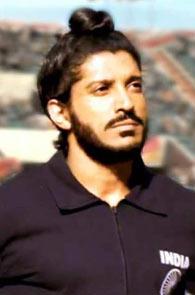
Farhan Akhtar is a machine.
Watching how he uses each muscle in his body -- on his neck, chest, arms, abdomen, legs -- as he runs in Rakeysh Omprakash Mehra’s Bhaag Milkha Bhaag, it is hard to believe that this father of two will turn 40 in exactly six months.
I do not know what Milkha Singh sounded like in the 1950s, but Akhtar is totally believable as the eager, energetic, naïve, yet very committed runner in his early 20s who broke the national record for 400 metres, first represented India in the Melbourne Olympics in 1956, and won gold medals at the Asian and Commonwealth games.
The sense we get from Mehra’s film is that Singh must have been a very likeable person -- or at least that is the myth that BMB creates.
And Farhan Akhtar -- the director of Dil Chahta Hai, the refurbished Don franchise and the actor in his sister’s two successful films, Luck By Chance and Zindagi Na Milegee Dobara -- is very likeable as Singh, with a wide smile that shows all his teeth.
If there is one reason to see BMB it is to watch Akhtar -- how much he has evolved as an actor and the sincerity with which he immerses himself in the character.
It is very rare to see a Bollywood actor this committed to his/her role, to totally become someone else. And I truly believed that Akhtar was a Sikh, well, barring a few times when he slipped and sounded like his poet/writer father’s Mumbai-bred son.
I wish I could find any other reason to recommend Mehra’s three-plus hour film that attempts to be an epic, but is really thin in plot and goes in so many different directions before it finally solves the so-called mystery: Why would Milkha Singh not run in Pakistan?
It is a mystery to Jawaharlal Nehru (played in a very straightforward manner by Dilip Tahil), his advisers and even to one of Singh’s coaches. If there is one person who knows the answer to this big mystery, it is Guruji (Pavan Malhotra) who is Singh’s first coach.
And so on a long train ride to Chandigarh, Guruji narrates Singh’s life to his companions and the audience.
Milkha Singh was no doubt an inspiring figure, but the three hours that Guruji takes to walk us through the runner’s story -- and that too just 13 years of his life (the story of Singh starts around 1947 and ends by 1960, when he had turned 25), seems way too long.
Even a vibrant performance by Akhtar cannot save a film that attempts to be an epic like Richard Attenborough’s Gandhi. But Milkha Singh’s life, eventful as it was, was nowhere as rich as that of Mahatma Gandhi.
Mehra’s script writer -- the very talented lyricist Prasoon Joshi -- stuffs the film with segments that seem irrelevant and inconsequential to the larger story.
In the three-hour period we are introduced to three women in Singh’s life (apart from his older sister played by Divya Dutta, who provides the film with all the right tear-jerking Bollywood moments) -- Nirmal Kaur (Sonam Kapoor), Stella (Rebecca Breeds) and Perizad (the Pakistani singer Meesha Shafi).
While the segments with each of the women are brief (Kapoor’s name may go down as the leading lady in a Bollywood film with the smallest role ever),